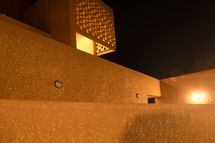Abijo Mosque
ARCHITECTS
Patrickwaheed Design Consultancy
PHOTOGRAPHS
Mujib Ojeifo, Rubyspolaroid
STRUCTURAL ENGINEER
First Beulah Consultants Limited
YEAR
2020
AREA
700 m²
CITY
Lagos
COUNTRY
Nigeria
LOCATION
LAGOS, NIGERIA
MANUFACTURERS
Aylum Aluminum, CDK Integrated Industries, PWDC
LEAD ARCHITECT
Adeyemo Shokunbi
CLIENT
Crescent Bearers
CATEGORY
HOUSES
DESIGN TEAM
Edith Ukagha, Damilare Ogunsanya, Abdur rahman Haruna
MAIN CONTRACTOR & SERVICES
Design and Build
M&E ENGINEER
Shematworld Engineering
Text description provided by architect.
Patrickwaheed Design Consultancy (PWDC) has completed a mosque in Abijo. It is a building donated to the Abijo community by Crescent Bearers 1939 Lagos. CB 1939 is an association that was set up over 80 years ago.
Their focus has been to promote community centered educational, religious and socio-cultural activities. Abijo takes its pseudonym from its location.
It is a building with a fusion of adopted and indigenous thought and execution. The building merged spirituality with materiality to evoke a vibe that looks and feels right.


The aesthetic of the mosque is based on the notion that the materiality had to be sustainable and locally sourced so that the frequent intervention through maintenance of the building was reduced considerably.
A textured skin consisting of laterite, sand and cement mixture was used to coat the external face of the envelope of the masjid (a place of prostration).
The insulation properties of the laterite wall, help keep the inside of the mosque cool. The objective was to avoid the usage of air-conditioning as a means of cooling the building during use.

Earthy colours as a theme was also a priority, so for the doors to maintain the same hue as the external walls, mild steel door panels were acid etched to give an earth-colour rusty finish.
This same ‘burnt’ finish was applied to all the mild steel used for the pulpit, sliding door frames and the fence railings.
The sliding doors have louvre windows incorporated into them to aid ventilation when the panels are not open.
The ceiling of the main hall and the mezzanine screens consist of forms and visual illustration of geometric compositions that can be fundamental elements for both the inside and outside religious buildings.

























